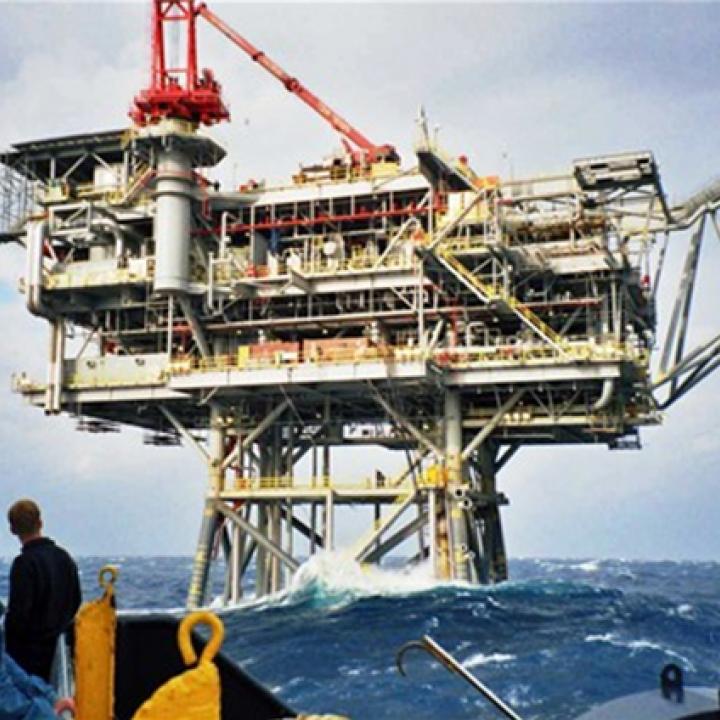
- Policy Analysis
- Policy Alert
Lebanon’s (Verbal) Threat Against Israeli Gas Exploration

Production from Israel’s Karish offshore natural gas field is scheduled to start later this year.
A simmering row between Lebanon and Israel over their mutual maritime border has returned to a boil with the arrival in the East Mediterranean of a specialized vessel to produce gas from Israel’s Karish field, which is located more than fifty miles off the country’s northern coast. The Energean Power is a floating production storage and offloading vessel (FPSO) that has been towed by two tugs all the way from Singapore, where it was built; last week, it passed through the Suez Canal.
Lebanon regards the Karish field as being in its exclusive economic zone (EEZ), the area coastal countries can claim stretching up to two hundred nautical miles beyond the normal twelve nautical miles of territorial waters. As yet, there is no agreed line between either the territorial or the EEZ claims of Israel and Lebanon, despite months of U.S.-mediated talks. Lebanon warned Israel on June 5 against any “aggressive action” and on June 6 invited American special energy envoy Amos Hochstein to restart his involvement although he had previously given up, apparently frustrated with Lebanese intransigence.
The Energean Power would be very vulnerable to hostile military action, and the Israeli media is reporting that the country’s navy is preparing to defend its operations against Hezbollah attacks with naval ships including submarines, as well as a seaborne Iron Dome antimissile battery.
The key to the so far unsuccessful maritime talks is an agreement on where the land border would extend once it reaches the sea. Israel was prepared to compromise on the EEZ claim it had filed more than a decade ago with the United Nations, but in 2020 Lebanon increased the scope of its claim. Instead of calling for a line close to the unexploited Karish field, Beirut argued for one farther south that encompassed the field, a demand Israel could not accept.
Another source of difficulty is Beirut’s desire for an agreement with the United Nations rather than with Israel, with which it is still theoretically at war. Lebanon also argues a legalistic point on the effect of a maritime line dividing small islands, even though it uses the reverse argument on its own northern maritime border with Syria. To compound the problem, the land border between Israel and Lebanon is not formally agreed, preventing a sense of definition on the point where it hits the Mediterranean.
Meanwhile, although Beirut has granted licenses to foreign companies to explore offshore areas, little activity has occurred and no substantial reserves have been discovered. Additionally, Lebanon is in dire need of energy to fuel power generators. Many Lebanese rely on oil-fueled local private generators, which offer only a few hours of electricity per day. A scheme for Egyptian gas to go via Jordan to Syria, and thereby generate electricity for Lebanon, has yet to become operational.
The newly arrived FPSO is due to start producing gas in the third quarter of this year, and the London-based Energean company already has contracts to supply Israel power stations. The Karish field, along with two others for which Energean has licenses, is much smaller than Israel’s current Leviathan and Tamar producing fields, but by using an FPSO all three are commercially viable.
Although this latest row remains for now at the diplomatic level, a significant danger exists of terrorist attack or larger military action. The increased tensions are perhaps a partial consequence of the news of the FPSO reaching the East Mediterranean. Its operations will be well out of sight of the coast, potentially allowing renewed U.S. efforts to calm or even resolve the tensions without the glare of publicity.
Simon Henderson is the Baker Fellow and director of the Bernstein Program on Gulf and Energy Policy at The Washington Institute.


